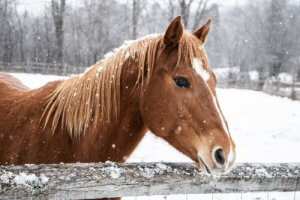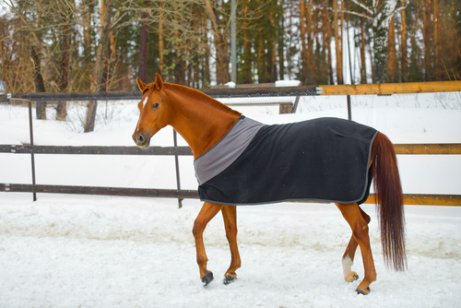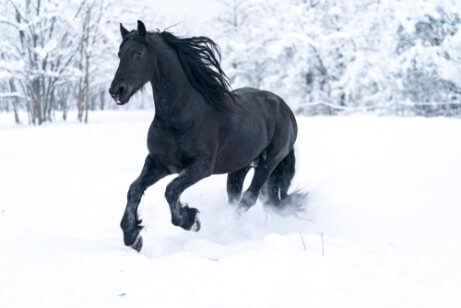Taking Care of Your Horse in Winter


Written and verified by the lawyer Francisco María García
Low temperatures and climate changes in winter can seriously affect a horse’s health. Therefore, it’s essential to reinforce the care of your horse in winter to offer optimal conditions for her development.
Below, we’ll give you some tips on how to care for the health of your horse in winter and how to prepare your barn.
Tips for preparing your horse’s stable for winter
Checking the structure
Before it starts to get cold, we recommend you check the structure of the stables to make sure they are prepared to protect your horse in the winter.
We recommend paying special attention to the roof. It’s important to make sure there are no holes or cracks where water can leak through or where the cold air can come in. If you have to fix small imperfections, you can use exterior putty.

Preparing your horse’s facilities
Each horse will need to have a ‘bed’ in its stable where it can sleep and rest. This area for relaxing and rest should be kept clean and warm. It should also have good lighting and ventilation. This way, the barn is kept free from accumulated dirt, mold, or moisture.
In cold regions, it’s a good idea to have a heating system to maintain stable temperatures inside the barn. In addition, a horse should always have access to a blanket. The caregiver can cover the horse before it goes to sleep.
Preserve optimal hygiene of the facilities and accessories
In addition to climate control inside the stable, you also should keep your horse clean to prevent disease. A daily cleaning to remove food residue and dirt is essential to avoid the spread of disease and parasites.
Daily ventilation and good natural light are also important to combat moisture and mold. In the winter, it can be humid, especially during rainy or snowy days. Therefore, you’ll need to be especially vigilant to avoid the stables from becoming infected with fungi or bacteria.

Essential care for your horse in winter
1. Feeding and hydration
Nutrition is one of the most essential things to pay attention to in the winter. As it gets colder, horses usually expend more energy in order to keep their metabolisms stable.
These animals need a more energy-efficient diet in the winter. This should contain high-quality proteins, essential fatty acids, fibers, vitamins, and minerals. Carbohydrates should also be present, but in moderate amounts to avoid digestive problems and excessive weight gain.
Consequently, your horse should be eating more in the winter. High-quality hay can continue to form the basis of their diet. However, you can also supplement their nutrition with foods rich in fibers and proteins, such as alfalfa and oats.
You also have to be aware of the hydration of your horse in the winter. Your horse should always have fresh, clean water, either in the barn or outdoors. In very cold regions, it’s important to be careful that the water doesn’t freeze.
2. Physical activity and grooming
Even when it’s cold outside, your horse still needs to get physical activity to maintain a healthy weight. Horses enjoy spending time outdoors and living with other horses, even in the winter.
Horses like to take advantage of the natural heat provided by the sun to fight the cold and feel more energetic. However, you should moderate exposure to sunlight to avoid burns and other skin complications.
In addition to daily exercise, your horse will also benefit from spending time with you in the winter. Therefore, remember to set aside time to pet and groom your horses. You have to take care of their coats too. You should also check their bodies for parasites or any skin issues.
3. Preventative medicine
Horses should have adequate preventative medicine throughout their lives. As the weather changes in the winter, this can lead to many diseases, such as hypothermia. It’s always important to check on your horse’s health before the arrival of winter.
Ask for a preventative appointment with a specialized veterinarian. It’s essential to verify if their vaccines and deworming are up to date. We also recommend consulting a trained professional about a supplement to help preserve the good health of your horse in the winter.
Low temperatures and climate changes in winter can seriously affect a horse’s health. Therefore, it’s essential to reinforce the care of your horse in winter to offer optimal conditions for her development.
Below, we’ll give you some tips on how to care for the health of your horse in winter and how to prepare your barn.
Tips for preparing your horse’s stable for winter
Checking the structure
Before it starts to get cold, we recommend you check the structure of the stables to make sure they are prepared to protect your horse in the winter.
We recommend paying special attention to the roof. It’s important to make sure there are no holes or cracks where water can leak through or where the cold air can come in. If you have to fix small imperfections, you can use exterior putty.

Preparing your horse’s facilities
Each horse will need to have a ‘bed’ in its stable where it can sleep and rest. This area for relaxing and rest should be kept clean and warm. It should also have good lighting and ventilation. This way, the barn is kept free from accumulated dirt, mold, or moisture.
In cold regions, it’s a good idea to have a heating system to maintain stable temperatures inside the barn. In addition, a horse should always have access to a blanket. The caregiver can cover the horse before it goes to sleep.
Preserve optimal hygiene of the facilities and accessories
In addition to climate control inside the stable, you also should keep your horse clean to prevent disease. A daily cleaning to remove food residue and dirt is essential to avoid the spread of disease and parasites.
Daily ventilation and good natural light are also important to combat moisture and mold. In the winter, it can be humid, especially during rainy or snowy days. Therefore, you’ll need to be especially vigilant to avoid the stables from becoming infected with fungi or bacteria.

Essential care for your horse in winter
1. Feeding and hydration
Nutrition is one of the most essential things to pay attention to in the winter. As it gets colder, horses usually expend more energy in order to keep their metabolisms stable.
These animals need a more energy-efficient diet in the winter. This should contain high-quality proteins, essential fatty acids, fibers, vitamins, and minerals. Carbohydrates should also be present, but in moderate amounts to avoid digestive problems and excessive weight gain.
Consequently, your horse should be eating more in the winter. High-quality hay can continue to form the basis of their diet. However, you can also supplement their nutrition with foods rich in fibers and proteins, such as alfalfa and oats.
You also have to be aware of the hydration of your horse in the winter. Your horse should always have fresh, clean water, either in the barn or outdoors. In very cold regions, it’s important to be careful that the water doesn’t freeze.
2. Physical activity and grooming
Even when it’s cold outside, your horse still needs to get physical activity to maintain a healthy weight. Horses enjoy spending time outdoors and living with other horses, even in the winter.
Horses like to take advantage of the natural heat provided by the sun to fight the cold and feel more energetic. However, you should moderate exposure to sunlight to avoid burns and other skin complications.
In addition to daily exercise, your horse will also benefit from spending time with you in the winter. Therefore, remember to set aside time to pet and groom your horses. You have to take care of their coats too. You should also check their bodies for parasites or any skin issues.
3. Preventative medicine
Horses should have adequate preventative medicine throughout their lives. As the weather changes in the winter, this can lead to many diseases, such as hypothermia. It’s always important to check on your horse’s health before the arrival of winter.
Ask for a preventative appointment with a specialized veterinarian. It’s essential to verify if their vaccines and deworming are up to date. We also recommend consulting a trained professional about a supplement to help preserve the good health of your horse in the winter.
This text is provided for informational purposes only and does not replace consultation with a professional. If in doubt, consult your specialist.








